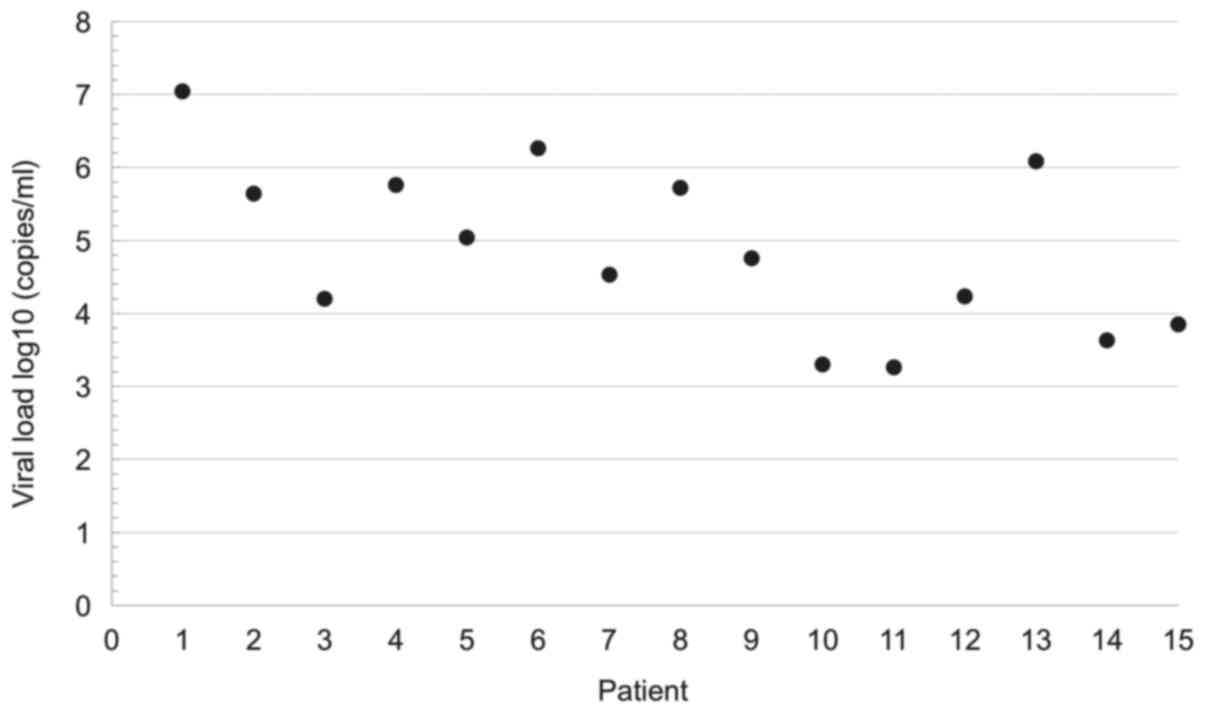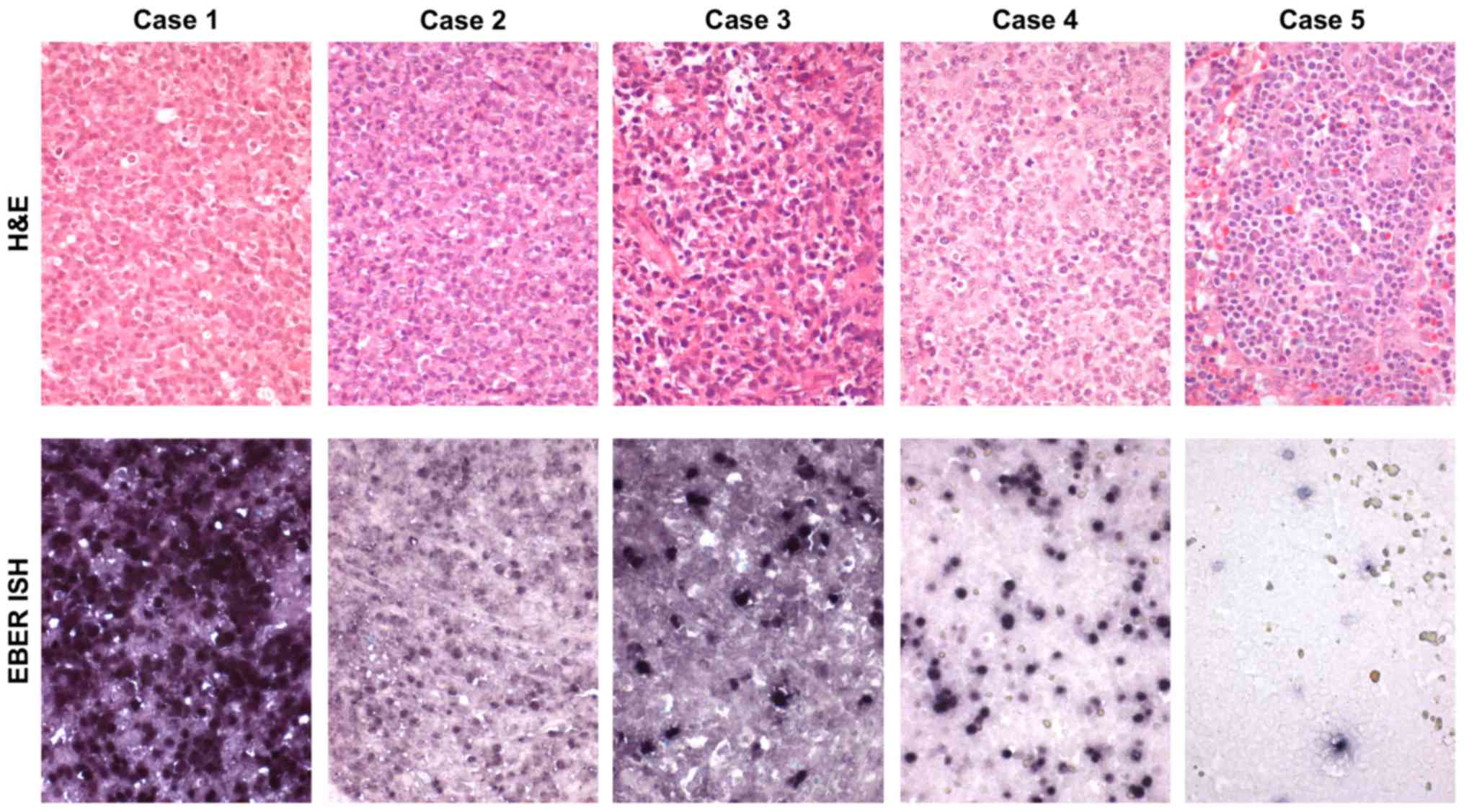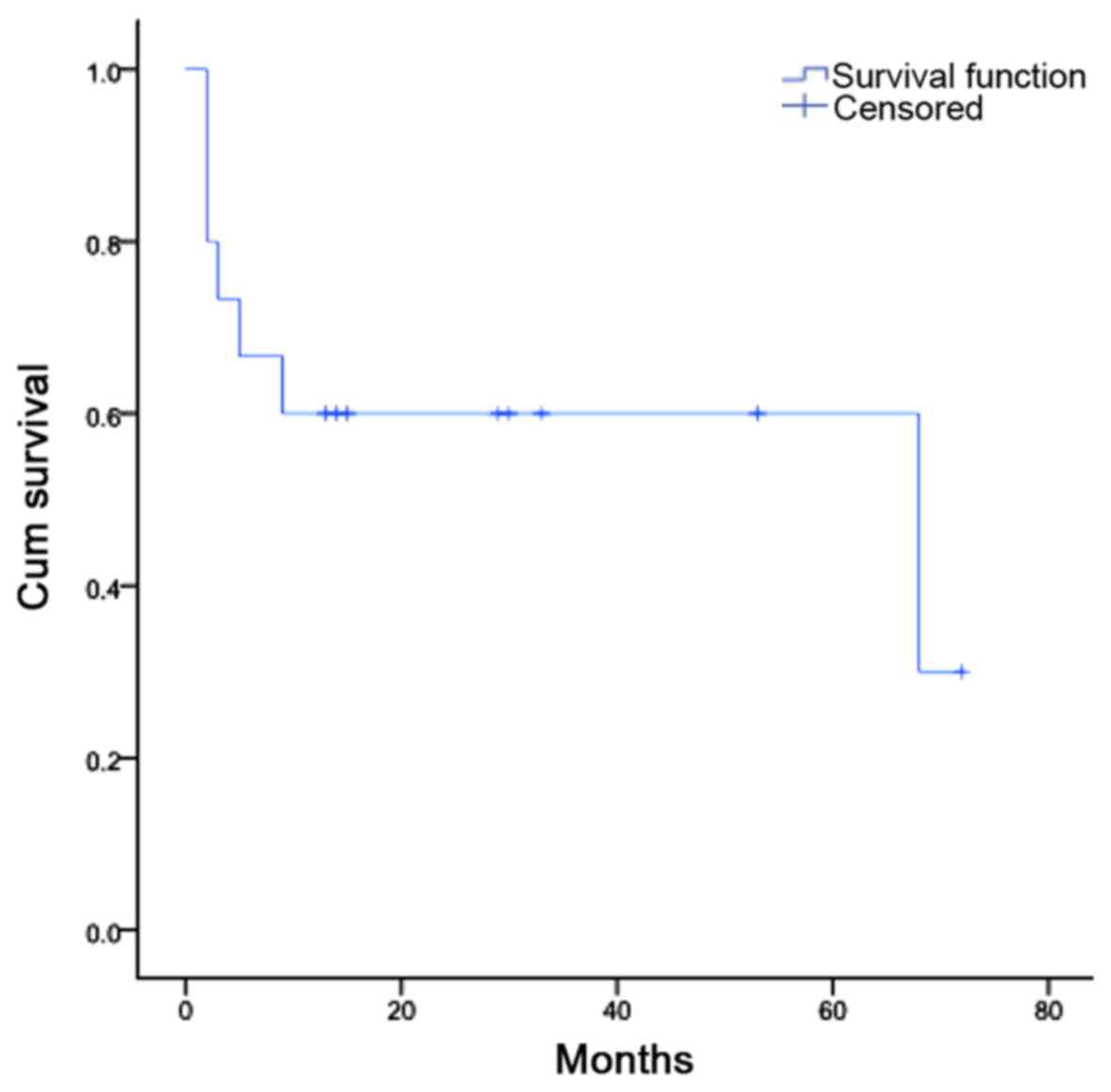|
1
|
Castellano-Sanchez AA, Li S, Qian J, Lagoo
A, Weir E and Brat DJ: Primary central nervous system
posttransplant lymphoproliferative disorders. Am J Clin Pathol.
121:246–253. 2004. View Article : Google Scholar : PubMed/NCBI
|
|
2
|
Gulley ML and Tang W: Using Epstein-Barr
viral load assays to diagnose, monitor, and prevent posttransplant
lymphoproliferative disorder. Clin Microbiol Rev. 23:350–366. 2010.
View Article : Google Scholar : PubMed/NCBI
|
|
3
|
Glotz D, Chapman JR, Dharnidharka VR,
Hanto DW, Castro MC, Hirsch HH, Leblond V, Mehta AK, Moulin B,
Pagliuca A, et al: The Seville expert workshop for progress in
posttransplant lymphoproliferative disorders. Transplantation.
94:784–793. 2012. View Article : Google Scholar : PubMed/NCBI
|
|
4
|
Mucha K, Foroncewicz B,
Ziarkiewicz-Wróblewska B, Krawczyk M, Lerut J and Paczek L:
Post-transplant lymphoproliferative disorder in view of the new WHO
classification: a more rational approach to a protean disease?
Nephrol Dial Transplant. 25:2089–2098. 2010. View Article : Google Scholar : PubMed/NCBI
|
|
5
|
Kalinova L, Indrakova J and Bachleda P:
Post-transplant lymphoproliferative disorder. Biomed Pap Med Fac
Univ Palacky Olomouc Czech Repub. 153:251–257. 2009. View Article : Google Scholar : PubMed/NCBI
|
|
6
|
Atalay A, Gökahmetoğlu S, Durmaz S,
Kandemir I, Sağlam D, Kaynar L, Eser B, Cetin M and Kılıç H:
Investigation of epstein-barr virus and parvovirus b19 DNA in
allogeneic stem cell transplant patients. Turk J Haematol.
31:155–160. 2014. View Article : Google Scholar : PubMed/NCBI
|
|
7
|
Kim MJ, Kim I, Bae HM, Seo K, Park N, Yoon
SS, Park S and Kim BK: Hematopoietic stem cell transplantation
after posttransplant lymphoproliferative disorder. J Korean Med
Sci. 25:781–784. 2010. View Article : Google Scholar : PubMed/NCBI
|
|
8
|
Caillard S, Lelong C, Pessione F and
Moulin B; French PTLD Working Group, : Post-transplant
lymphoproliferative disorders occurring after renal transplantation
in adults: Report of 230 cases from the French registry. Am J
Transplant. 6:2735–2742. 2006. View Article : Google Scholar : PubMed/NCBI
|
|
9
|
Funch DP, Walker AM, Schneider G, Ziyadeh
NJ and Pescovitz MD: Ganciclovir and acyclovir reduce the risk of
post-transplant lymphoproliferative disorder in renal transplant
recipients. Am J Transplant. 5:2894–2900. 2005. View Article : Google Scholar : PubMed/NCBI
|
|
10
|
Allen U and Preiksaitis J; AST Infectious
Diseases Community of Practice, : Epstein-barr virus and
posttransplant lymphoproliferative disorder in solid organ
transplant recipients. Am J Transplant. 9 Suppl 4:S87–S96. 2009.
View Article : Google Scholar : PubMed/NCBI
|
|
11
|
Bar-Natan M and Nagler A: Epstein-barr
virus-associated post-transplant lymphoproliferative disorder. Isr
Med Assoc J. 8:205–207. 2006.PubMed/NCBI
|
|
12
|
Grywalska E, Markowicz J, Grabarczyk P,
Pasiarski M and Roliński J: Epstein-barr virus-associated
lymphoproliferative disorders. Postepy Hig Med Dosw (Online).
67:481–490. 2013. View Article : Google Scholar : PubMed/NCBI
|
|
13
|
Luo L, Zhang L, Cai B, Li H, Huang W, Jing
Y, Zhu H, Zhao Y, Bo J, Wang Q, et al: Post-transplant
lymphoproliferative disease after allogeneic hematopoietic stem
cell transplantation: A single-center experience. Ann Transplant.
19:6–12. 2014. View Article : Google Scholar : PubMed/NCBI
|
|
14
|
Bhatia S: Long-term health impacts of
hematopoietic stem cell transplantation inform recommendations for
follow-up. Expert Rev Hematol. 4:437–452; quiz 453–454. 2011.
View Article : Google Scholar : PubMed/NCBI
|
|
15
|
Ibrahim HA and Naresh KN: Posttransplant
lymphoproliferative disorders. Adv Hematol. 2012:2301732012.
View Article : Google Scholar : PubMed/NCBI
|
|
16
|
Choi JH, Park BB, Suh C, Won JH, Lee WS
and Shin HJ: Clinical characteristics of monomorphic
post-transplant lymphoproliferative disorders. J Korean Med Sci.
25:523–526. 2010. View Article : Google Scholar : PubMed/NCBI
|
|
17
|
Burns DM, Rana S, Martin E, Nagra S, Ward
J, Osman H, Bell AI, Moss P, Russell NH, Craddock CF, et al:
Greatly reduced risk of EBV reactivation in rituximab-experienced
recipients of alemtuzumab-conditioned allogeneic HSCT. Bone Marrow
Transplant. 51:825–832. 2016. View Article : Google Scholar : PubMed/NCBI
|
|
18
|
Safdar A: Principles and Practice of
Cancer Infectious DiseasesCurrent Clinical Oncology. Humana Press;
New York, NY: 2011
|
|
19
|
Brunstein CG, Weisdorf DJ, DeFor T, Barker
JN, Tolar J, van Burik JA and Wagner JE: Marked increased risk of
Epstein-Barr virus-related complications with the addition of
antithymocyte globulin to a nonmyeloablative conditioning prior to
unrelated umbilical cord blood transplantation. Blood.
108:2874–2880. 2006. View Article : Google Scholar : PubMed/NCBI
|
|
20
|
Bhatia S, Ramsay NK, Steinbuch M,
Dusenbery KE, Shapiro RS, Weisdorf DJ, Robison LL, Miller JS and
Neglia JP: Malignant neoplasms following bone marrow
transplantation. Blood. 87:3633–3639. 1996.PubMed/NCBI
|
|
21
|
Styczynski J, Einsele H, Gil L and
Ljungman P: Outcome of treatment of Epstein-Barr virus-related
post-transplant lymphoproliferative disorder in hematopoietic stem
cell recipients: a comprehensive review of reported cases. Transpl
Infect Dis. 11:383–392. 2009. View Article : Google Scholar : PubMed/NCBI
|
|
22
|
Styczynski J, van der Velden W, Fox CP,
Engelhard D, de la Camara R, Cordonnier C and Ljungman P; Sixth
European Conference on Infections in Leukemia, a joint venture of
the Infectious Diseases Working Party of the European Society of
Blood and Marrow Transplantation (EBMT-IDWP), the Infectious
Diseases Group of the European Organization for Research and
Treatment of Cancer (EORTC-IDG), the International
Immunocompromised Host Society (ICHS) and the European Leukemia Net
(ELN), : Management of Epstein-Barr Virus infections and
post-transplant lymphoproliferative disorders in patients after
allogeneic hematopoietic stem cell transplantation: Sixth European
Conference on Infections in Leukemia (ECIL-6) guidelines.
Haematologica. 101:803–811. 2016. View Article : Google Scholar : PubMed/NCBI
|

















